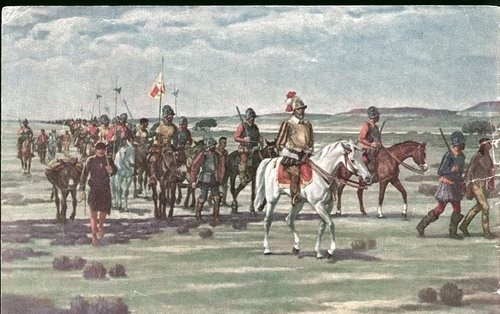During the siege of Tiguex the general decided to go to Cicuye and take the governor with him, in order to give him his liberty and to promise them that he would give Whiskers his liberty and leave him in the village, as soon as he should start for Quivira.
He was received peacefully when he reached Cicuye, and entered the village with several soldiers. They received their governor with much joy and gratitude. After looking over the village and speaking with the natives[163] he returned [p503] to his army, leaving Cicuye at peace, in the hope of getting back their captain Whiskers.
After the siege was ended, as we have already related, he sent a captain to Chia, a fine village with many people, which had sent to offer its submission. It was 4 leagues distant to the west of the river. They found it peaceful and gave it four bronze cannon, which were in poor condition, to take care of. Six gentlemen also went to Quirix, a province with seven villages. At the first village, which had about a hundred inhabitants, the natives fled, not daring to wait for our men; but they headed them off by a short cut, riding at full speed, and then they returned to their houses in the village in perfect safety, and then told the other villagers about it and reassured them. In this way the entire region was reassured, little by little, by the time the ice in the river was broken up and it became possible to ford the river and so to continue the journey. The twelve villages of Tiguex, however, were not repopulated at all during the time the army was there, in spite of every promise of security that could possibly be given to them.
And when the river, which for almost four months had been frozen over so that they crossed the ice on horseback, had thawed out, orders were given for the start for Quivira, where the Turk said there was some gold and silver, although not so much as in Arche and the Guaes. There were already some in the army who suspected the Turk, because a Spaniard named Servantes,[164] who had charge of him during the siege, solemnly swore that he had seen the Turk talking with the devil in a pitcher of water, and also that while he had him under lock so that no one could speak to him, the Turk had asked him what Christians had been killed by the people at Tiguex. He told him “nobody,” and then the Turk answered: “You lie; five Christians are dead, including a captain.” And as Cervantes knew that he told the truth, he confessed it so as to find out who had told him about it, and the Turk said he knew it all by himself and that he did not need to have anyone tell him in order to know it. And it was on account of this that he watched him and saw him speaking to the devil in the pitcher, as I have said.
While all this was going on, preparations were being made to start from Tiguex. At this time people came from Cibola to see the general, and he charged them to take good care of the Spaniards who were coming from Señora with Don Pedro de Tovar. He gave them letters to give to Don Pedro, informing him what he ought to do and how he should go to find the army, and that he would find letters under the crosses which the army would put up along the way. The army left Tiguex on the 5th of May[165] and returned to Cicuye, which, as I have said, is twenty-five marches, which means leagues, from there, taking Whiskers with them. Arrived there, he gave them, their captain, who already went about freely with a guard. The village was very glad to see him, and the people were peaceful and offered food. The governor and [p504] Whiskers gave the general a young fellow called Xabe, a native of Quivira, who could give them information about the country. This fellow said that there was gold and silver, but not so much of it as the Turk had said. The Turk, however, continued to declare that it was as he had said. He went as a guide, and thus the army started off from here.
Notes:
[163] Compare the Spanish text. Ternaux: “Le général le rétablit dans sa dignité, examina le pays, et retourna au camp.”
[164] Or Cervantes, as Ternaux spells it.
[165] Coronado says, in his letter of October 20, that he started April 23.

